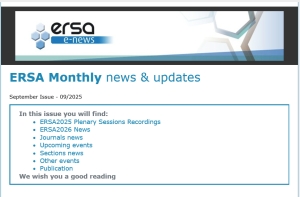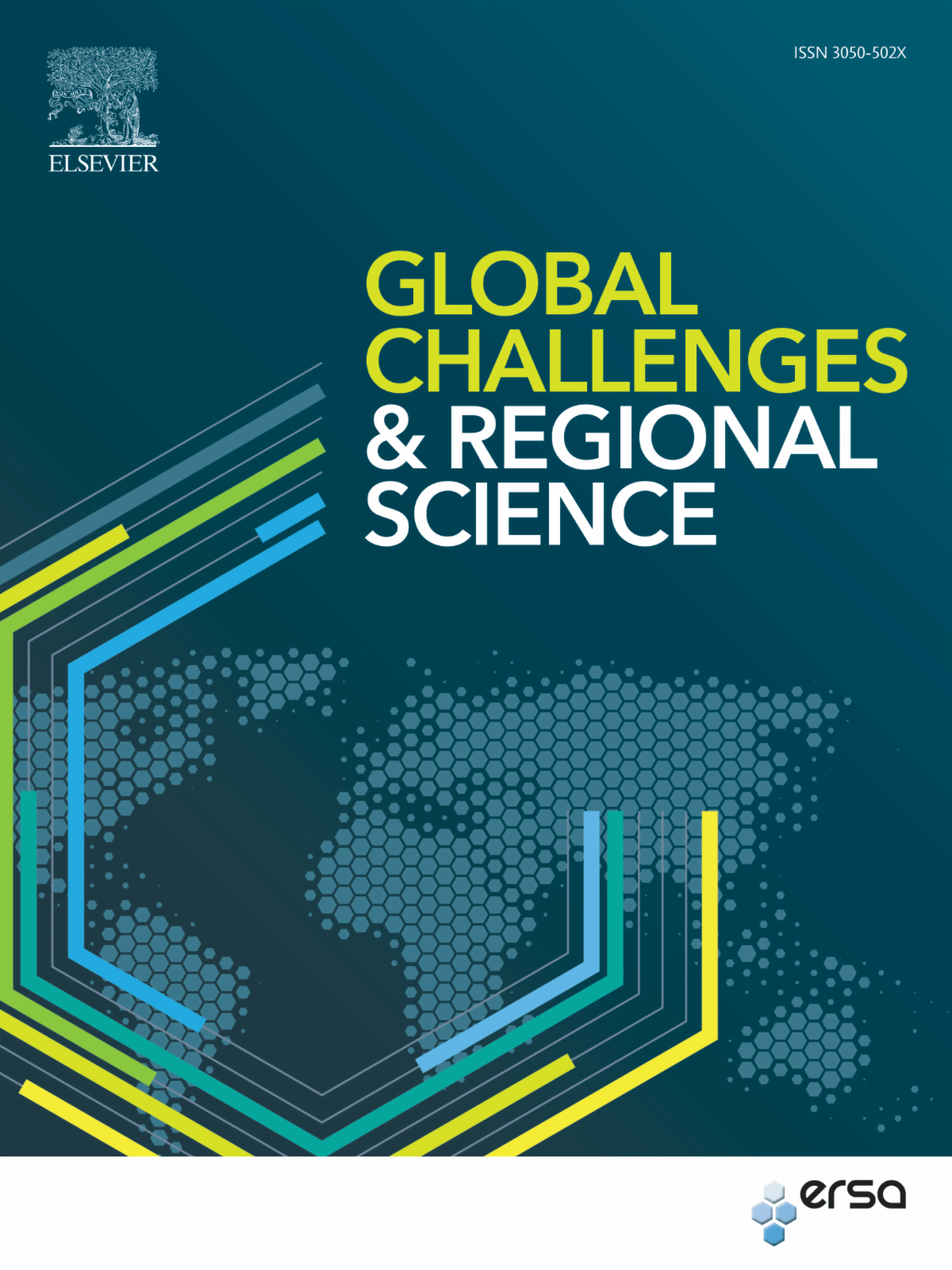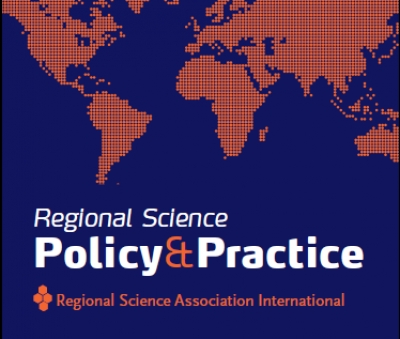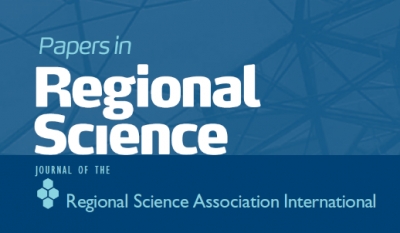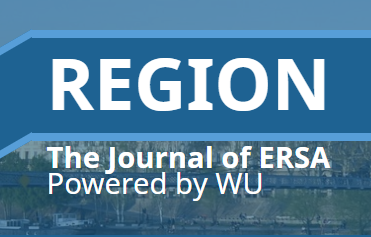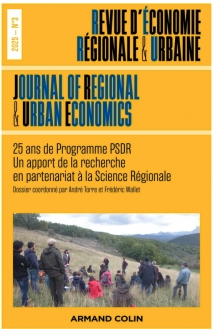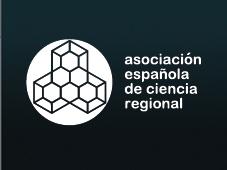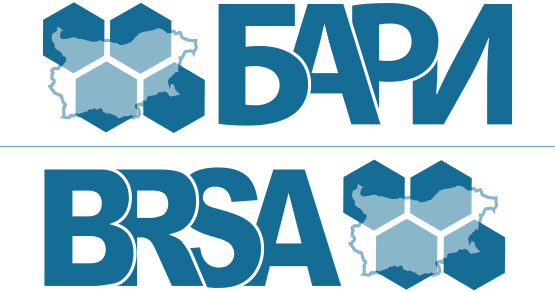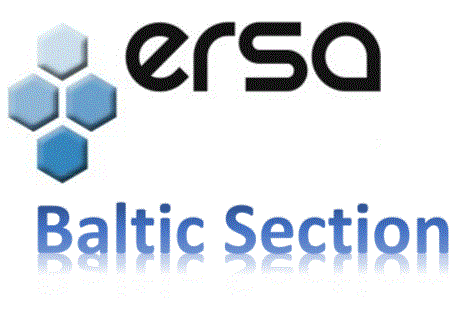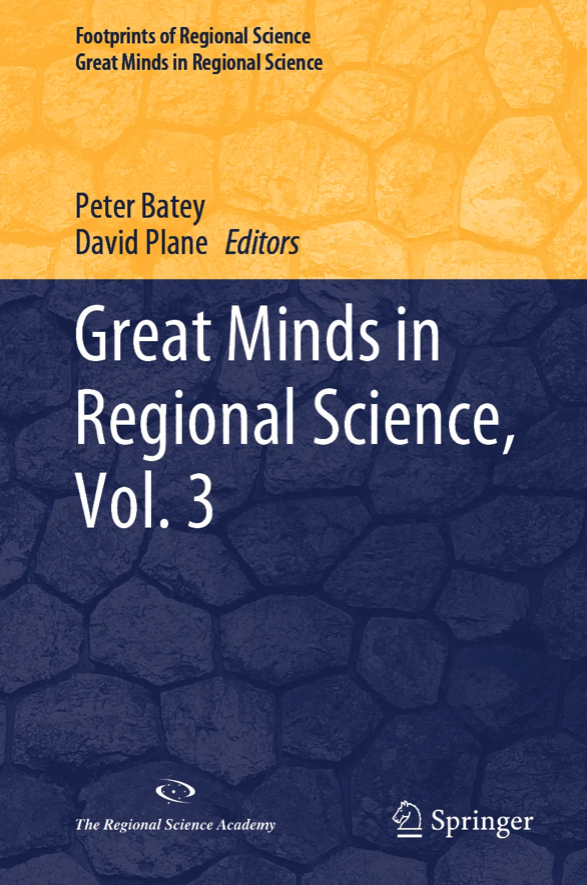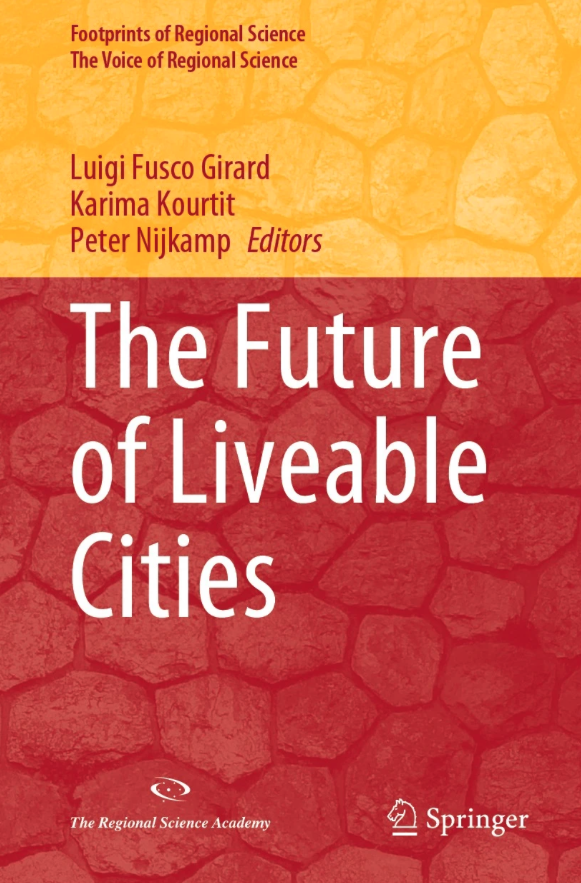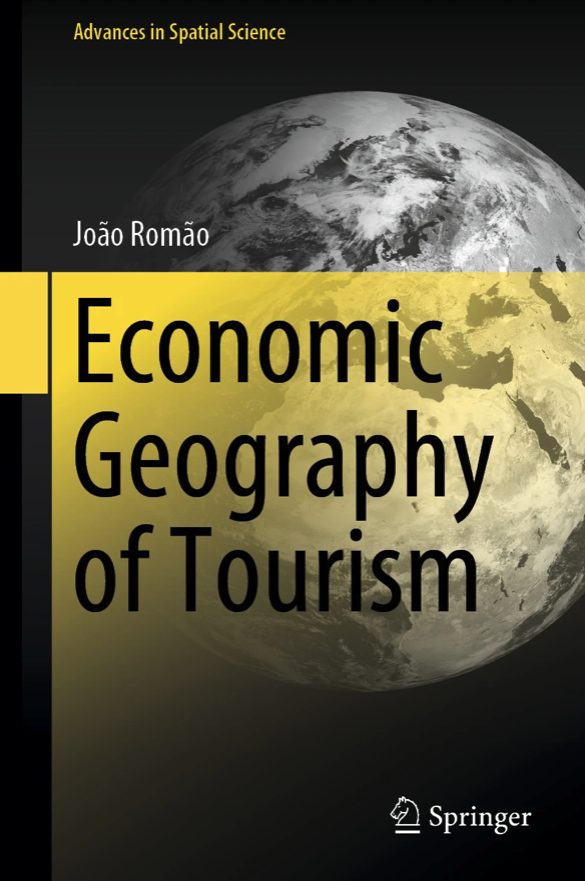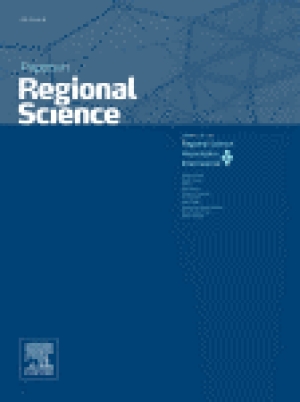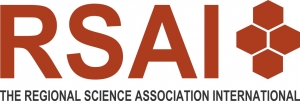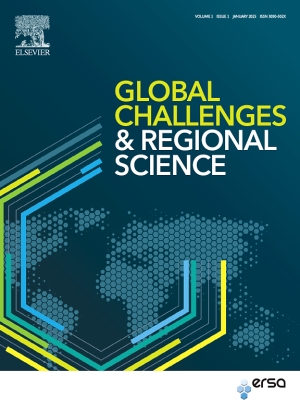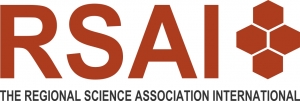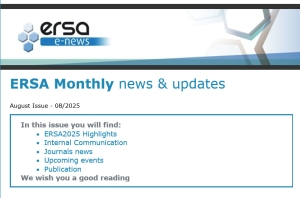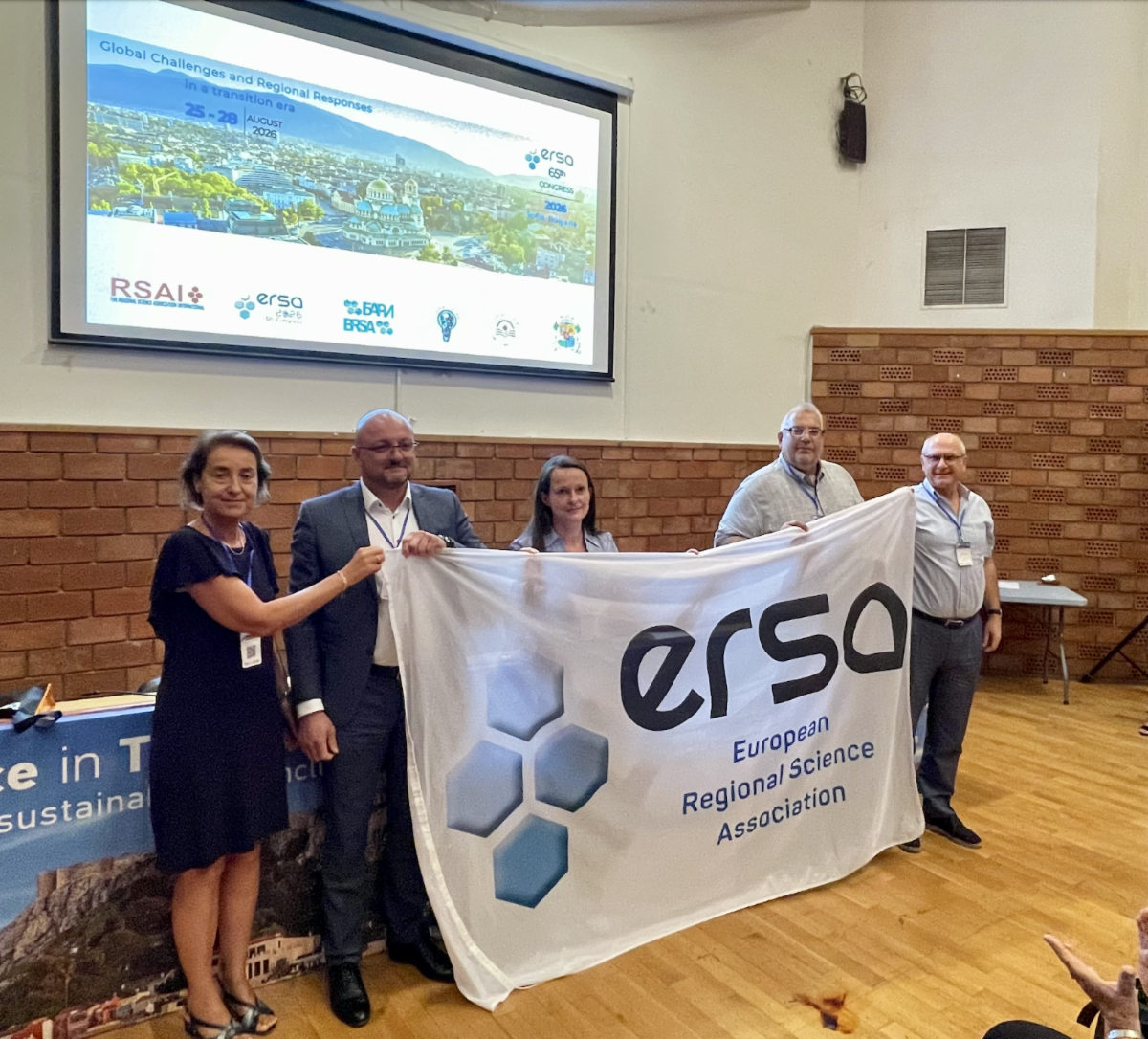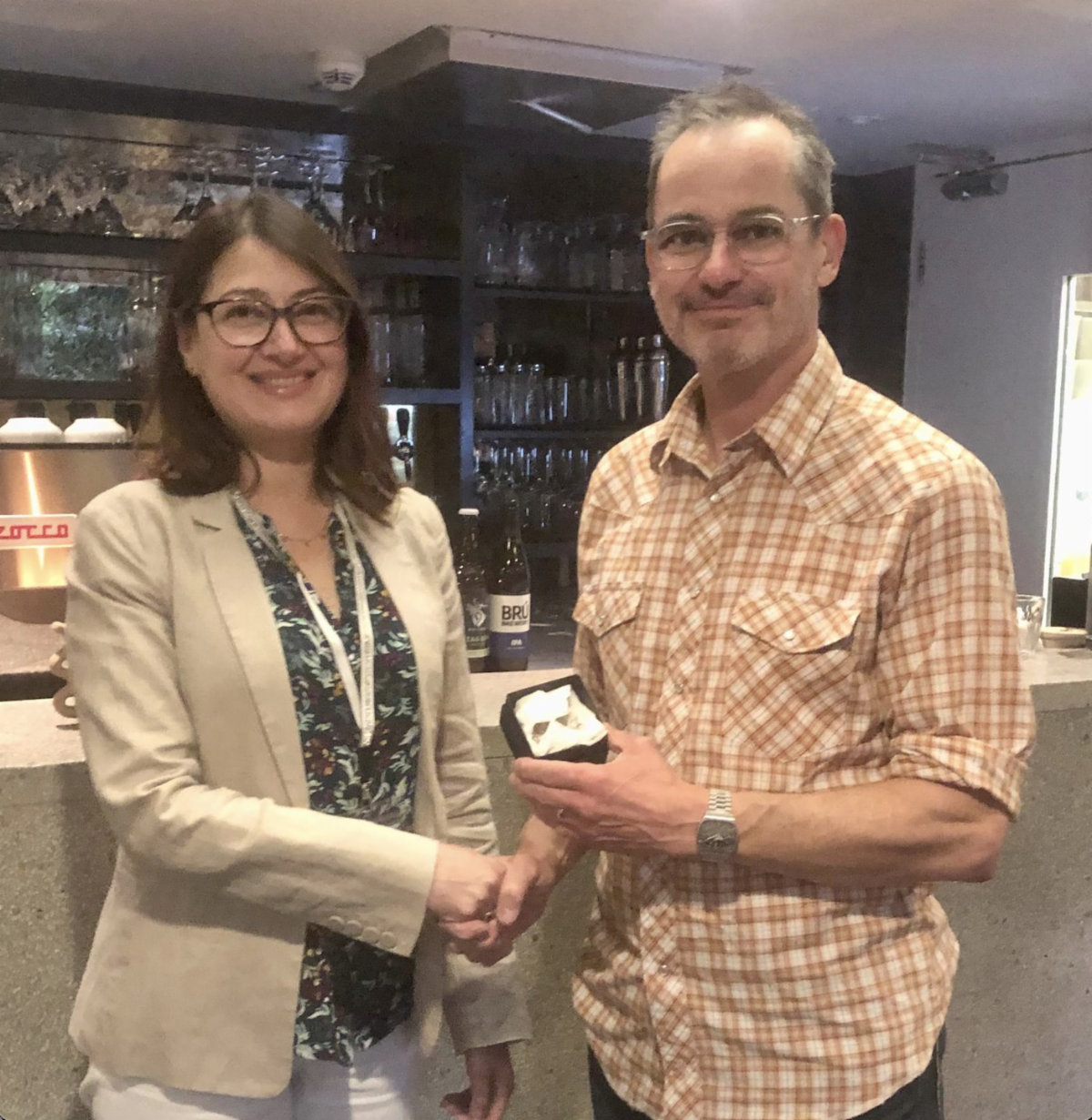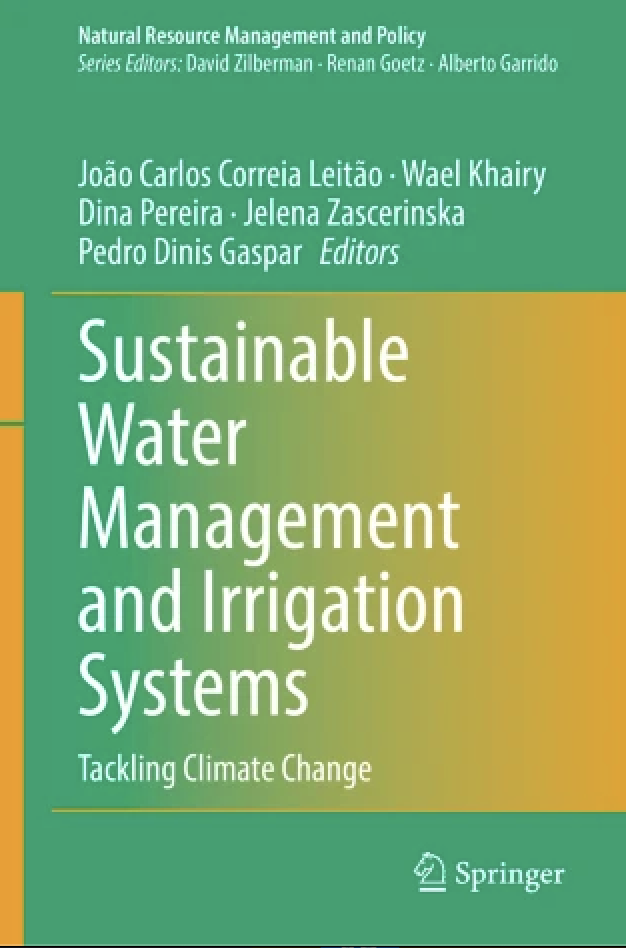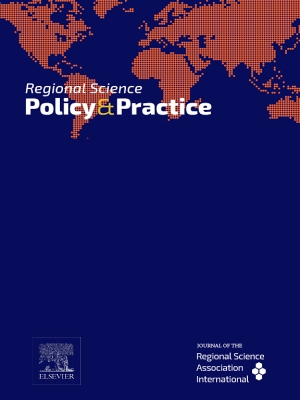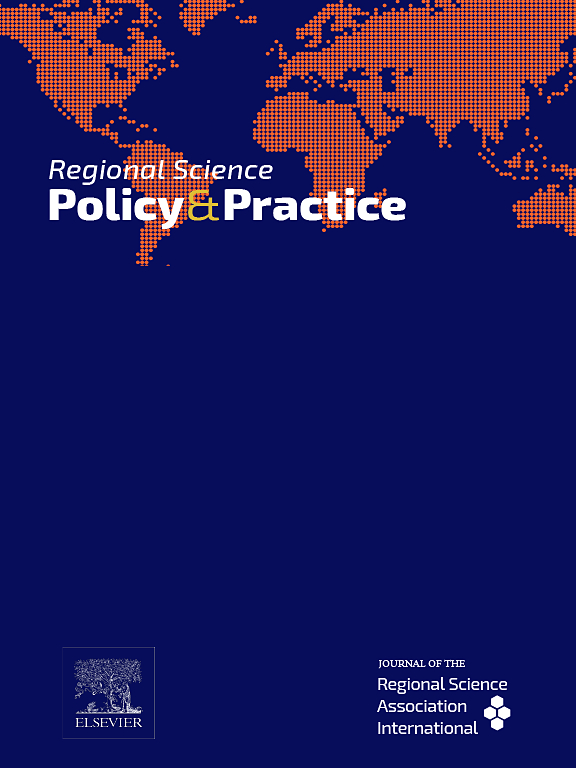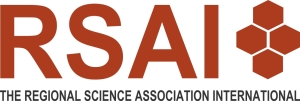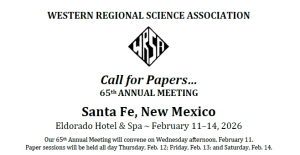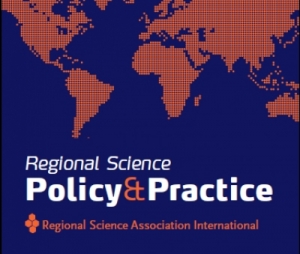News
Elisabete Martins
ERSA Monthly E-news - September 2025
|
New Issue: Papers in Regional Science | Volume 104, Issue 5, October 2025
Call for candidatures for new RSAI president
Dear Members of the Regional Science Association International,
according to the RSAI Constitution, each first year of term of the RSAI President, the Association faces the pleasant task of electing the Incoming President, who will in 2026 take on the position of President Elect, and work along with Prof. Hiroyuki Shibusawsa, current RSAI President, to gradually move on to the position of President in 2027. Here is an excerpt of the rules of the Association for managing this important step:
Nomination committee. The RSAI Council has appointed a dedicated nomination committee, that following the rule of the RSAI Constitution is made up of the RSAI President (Hiroyuki Shibusawsa), the RSAI Immediate Past-President (Hans Westlund), four members of the RSAI Council (one each from among the council members who are appointees of the four superregional organizations: Roberta Capello for ERSA, In Kwon Park for PRSCO, Andre Chagas for LARSA; Sarah Low for NARSC), and two members of the Long Range Planning Committee (LRPC) recommended by the LRPC itself (Eduardo Haddad and Budy Resosurdamo).
Criteria of the nominees. The nominees should satisfy the following criteria: a) financial resources sufficient to cover travel costs to perform RSAI duties; b) support from candidate’s institution including relaxation of duties to enable President to travel as needed to execute RSAI business; c) RSAI Council experience (Council member experience) and/or other service to the regional science community (e.g., supra-regional and/or other sections, editor or one of the regional science journals, etc.).
Election procedure. The President Elect nomination committee shall [...] make a recommendation to Council at a Council meeting of this same year. Upon receiving this recommendation, the Council will select a nominee. The President‐Elect and Vice‐President shall start his/her appointment at the start of the next calendar year (i.e. the second year of the current President’s term).
RSAI members from the NARSC area who want to be nominated as candidate for the President of the Regional Science Association International should send to This email address is being protected from spambots. You need JavaScript enabled to view it. (cc-ing the RSAI ED at This email address is being protected from spambots. You need JavaScript enabled to view it.) within Oct. 15, 2025 the following material:
- A two-page CV and a Picture;
- A two-page statement on the motives in support of the candidacy and on the future strategy for the RSAI.
The Nomination Committee will then nominate the candidates to be voted on-line by the Members of the Council. Results will be diffused through in RSAI webpage.
Thank you in advance for participating in this crucial stage of the Association's life,
Kind regards,
New Issue: Global Challenges & Regional Science, Volume 3, September 2025
New Issue: Global Challenges & Regional Science
New issue available on ScienceDirect
 |
Global Challenges & Regional Science |
|
|
|
|
|
|
|
Call for Applications for RSAI Councilors-at-large
Dear RSAI members,
It is time to elect ONE "Councilor at large" to be part of the RSAI Council for the period 2026-2028.
The RSAI and its internal organization are not very well known. Please take 2 minutes of your time to read how it works! (https://regionalscience.org/index.php/about-us.html)
The RSAI Council comprises the RSAI President, the RSAI Executive Director, 3 representatives from each supranational (ERSA, LARSA, PRSCO and NARSC) and 5 Councilors-at-large.
While 3 members are elected from each supranational to keep geographical balance within RSAI, the 5 "councilors at large" will be elected by the members of the RSAI Council among the self-nominated applicants, who will simply need to be a RSAI member in good standing.
The position on the RSAI Council held by Prof. Daniela Constantin (Bucharest University of Economic Studies) will expire at the end of 2025.
If you are interested in being councilor-at-large, please send a letter of interest including your professional CV and a photo to RSAI Secretariat (This email address is being protected from spambots. You need JavaScript enabled to view it.) before September 30th 2025.
The election of a councilor-at-large for the period 2026-2028 will take place electronically by RSAI members during the month of October 2025.
Kind regards,
Dr Ana Viñuela
RSAI Executive Director
Associate Professor, Applied Economics Department
REGIOlab, University of Oviedo, Spain
European Project EXIT (https://www.exit-project.eu/)
ERSA Monthly E-news - August 2025
|
|||||||||||||||||||||||||||||||||||||||||||||||||||||||||||||||||||||||||||||||||||||||||||||||||||||||||||||||||||||||||||||||||||||||||||||||||||
|
|||||||||||||||||||||||||||||||||||||||||||||||||||||||||||||||||||||||||||||||||||||||||||||||||||||||||||||||||||||||||||||||||||||||||||||||||||
|
|
New Issue: Regional Science Policy & Practice | Volume 17, Issue 9, September 2025
|
|
Articles
Book Review
|
Call for Applications | 2025 RSAI Dissertation Award, Deadline: August 31, 2025
2025 RSAI Best Dissertation in Regional Science
Call for submissions
Deadline for the applications: August 31, 2025
The Regional Science Association International (RSAI) invites submissions for the annual competition for the Best Doctoral Dissertation in Regional Science. Regional science is an interdisciplinary field concerned with theory, method, and application of regional, urban and rural, geographic and spatial investigations and analyses.
The winner will be decided by the Selection Committee and will receive a cash award of 750 Euros. Award announcements will be made at the North American Meetings of the RSAI, where participants in the competition are strongly encouraged to be present. The Selection Committee reserves the right to not make an award. Decisions made by the Selection Committee are final.
Eligibility:
- A dissertation completed in any PhD program in any country is eligible,
- A dissertation written in English,
- A dissertation successfully defended, with official graduation date between July 1st 2024 and June 30th 2025,
- A dissertation on a single or multiple general regional science topics. The Selection Committee reserves the right to determine whether a dissertation is relevant to the field of regional science.
Application (in either PDF or MS Word format):
- A two-page curriculum vita;
- A letter of support and nomination from the major professor (also known as a dissertation committee chairperson or supervisor) on stationary paper and with signature. The letter should clearly explain the dissertation’s originality and contributions to the field of regional science;
- The dissertation.
Applications should be submitted electrically by August 31, 2025, to the Chair of the Selection Committee, Dimitris Ballas (This email address is being protected from spambots. You need JavaScript enabled to view it.). Large submissions can be uploaded to a cloud file-sharing site. Questions regarding the dissertation competition may be sent to him too.
Call for Papers | WRSA 2026 Annual Meeting, Feb 11-14, 2026, Santa Fe, New Mexico
WESTERN REGIONAL SCIENCE ASSOCIATION
Call for Papers…
65th ANNUAL MEETING
Santa Fe, New Mexico
Eldorado Hotel & Spa ~ February 11–14, 2026
Our 65th Annual Meeting will convene on Wednesday afternoon, February 11.
Paper sessions will be held all day Thursday, Feb. 12; Friday, Feb. 13; and Saturday, Feb. 14.
- SUBMISSIONS ON ANY TOPIC WITHIN THE REALM OF REGIONAL SCIENCE ARE WELCOMED
- THE PROGRAM COMMITTEE SCREENS PAPERS FOR SUITABILITY BEFORE INVITATIONS ARE SENT
POTENTIAL TOPICS INCLUDE:
Resource Utilization; Impact Analysis; Regional Modeling; Location of Economic Activity; Housing; Regional & Urban Planning; Environmental Quality; Regional Development; Migration and Demographic Analysis; Transportation; Locational Criteria for Public Services & Facilities; Tourism & Recreation; Local Public Finance; Energy Issues; Regional Science Epistemology & Pedagogy; Urban & Regional Resilience
WRSA’s collegial “seminar-style” sessions provide the opportunity for authors to receive helpful feedback.
All accepted papers are allotted 45 minutes of program time, inclusive of the remarks of an assigned discussant
For consideration by the Program Committee, submit your paper before the customary
Paper Submission Deadline: OCTOBER 15, 2025
Acceptances will not be made on the basis of abstracts or presentation slides
Papers may be in DRAFT form at the time of submission; FINAL versions due: January 15, 2026
PAPER SUBMISSION DIRECTIONS:
- Visit the WRSA website (https://www.wrsaonline.org/) and follow the paper submission instructions
- Files must be in PDF format
- Large graphics files should NOT be included at the submittal stage (figures may be sent later, directly to the discussant)
- On multiple-authored papers, the online system will ask to indicate which author(s) will participate at the conference
- Per WRSA Board policy there is a limit of one paper presentation per paid, registered participant
Visit the WRSA website for complete conference information…
…or contact: Jaewon Lim, Executive Director, WRSA
School of Public Policy & Leadership | 4505 S. Maryland Parkway | University of Nevada, Las Vegas | Las Vegas, NV, 89154
Email: This email address is being protected from spambots. You need JavaScript enabled to view it. or This email address is being protected from spambots. You need JavaScript enabled to view it. | Website: https://www.wrsaonline.org/
Call for Papers | RSPP Special Issue: Migrant Integration Challenges and Policies

Call for Papers for Special Issue in Regional Science Policy & Practice (RSPP)
Title: "Migrant Integration Challenges and Policies"
Guest Editors
Joaquim Oliveira Martins This email address is being protected from spambots. You need JavaScript enabled to view it.
Tomaz Ponce Dentinho This email address is being protected from spambots. You need JavaScript enabled to view it.
Immigration is expanding all over the world, driven by conflicts, and fueled by declining populations, the availability of jobs and a relatively good welfare state in developed places, as well as the poverty and social instability in less developed territories.
Measured through employment and education, the integration of migrants into more developed communities has improved (OECD, 2023). However, the integration process is not the same everywhere, especially when all aspects of integration are considered more relevant for second generation migrants.
The assumption is that integration is part of migration and important for the economy, peace and the development of people and places. The principle is that connection and belonging constitute basic human rights, contributing to social justice and equity (Litevsky et al., 2023).
However, there are several integration models that involve different forms and combinations of cultural maintenance, cultural adaptation and cultural convergence. Immigrant integration needs to be deployed over several dimensions: economic integration (such as employment and entrepreneurship); social and cultural Integration (such as language and community participation); institutional Integration (access to public services housing, etc.); and civic and political Integration (such as civic rights and engagement). These processes, according to (Bloemraad et al., 2023), are historically contingent, mediated by institutions and politically constructed, opening paths for certain groups of immigrants, while erecting barriers for others.
The objective of this special issue of RSPP is to gather knowledge that reports, analyzes and evaluates evidence of the integration of migrants in relatively more affluent cities and places that are relatively more attractive than others.
References
- Bloemraad I, Isso VM, Kymlicka W, Zhou Y-Y (2023) Unpacking immigrant integration: Concepts, mechanisms and context. Background paper to World Development Report 2023: Migrants, Refugees, and Societies.
- Haim-Litevsky D, Komemi R, Lipskaya-Velikovsky L (2023) Sense of belonging, meaningful daily participation and well-being: Integrated research. International Journal of Environmental Research and Public Health, 20(5), 4121.
- OECD/European Union (2023) Immigrant Integration Indicators 2023, OECD Publishing, Paris
All manuscripts will be submitted via the Regional Science Policy & Practice online submission system (https://www.editorialmanager.com/rspp/). Papers should have between 6000 and 8000 words. Authors should indicate in the cover letter that the paper is submitted for consideration for publication in this special issue “MIGRANT INTEGRATION CHALLENGES AND POLICIES”, otherwise, your submission will be handled as a regular manuscript. Regional Science Policy & Practice is a gold open access journal. This means that articles accepted for publication will be subject to the payment of an Article Publishing Charge (APC). Standard fees are described in detail on the journal home page.
Submission deadline: December 31 2025
About Us
The Regional Science Association International (RSAI), founded in 1954, is an international community of scholars interested in the regional impacts of national or global processes of economic and social change.

